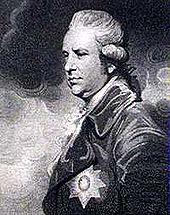Macartney Mission
The Macartney Mission was a 1793 mission by King George III of Britain . Embassy sent to China .
prehistory
Since its first forays into the Middle Kingdom in 1635, the British East India Company had been allowed to trade by the imperial court only under restrictive conditions. The only foreign trade ports were Zhoushan , Xiamen and Canton , and from 1760 onwards only the latter. There the British merchants could not move freely, but lived in a kind of ghetto and were only allowed to work with the Chinese trading houses through the mediation of the merchants of the Cohong guild as well as trade officials appointed by the court, so-called (" Hoppo " 關 部 , guan1bu4 , Chinese Customs director in canton). In addition, there were all kinds of administrative harassment and monopoly-administrative price fixing at the expense of the strangers.
course
In the course of the rise of England to a globally operating sea power and the self-confidence that went with it, the court in London was determined to end this discriminatory practice. In September 1792 he therefore sent the diplomatically accomplished Northern Irish Lord Macartney to the Middle Kingdom with three warships, 66 cannons and a hundred-member retinue consisting of scientists, artists, guards, servants and Chinese teachers. The members of the legation included the later second secretary of the Admiralty John Barrow and the German Johann Christian Hüttner . Both later wrote a report on the trip.
Before the Mission's departure, Home Secretary Henry Dundas briefed Lord Macartney on the objectives to be pursued:
- negotiating a trade and friendship treaty with China and establishing regular diplomatic relations with a permanent British embassy in Beijing,
- the expansion of British trade by opening up Chinese ports to sell products from the British textile industry,
- the acquisition of a small base on the mainland or a small island that was closer to the silk and tea-producing areas than the previous trading center of Canton, and where British merchants could reside permanently and were under British jurisdiction,
- the abolition of the previous trading system in Canton and the assurance that it would not be reintroduced,
- the opening of new sales markets for future British products,
- opening up Japan and Vietnam to British trade through treaties.
After his arrival in Canton , Lord Macartney was allowed to sail directly to Tianjin , since he pretended to have come for Emperor Qianlong's 80th birthday . The English were finally received on September 14, 1793 in the summer palace of Jehol with great ceremony, but nevertheless as an embassy from an inferior, tributary country.
Despite generous guest gifts, Lord Macartney of the emperor moved already by the displeasure to that he insisted on only bend the knee to the emperor rather than in protokollarisch correct kowtow to throw to the ground. His request for the abolition of the far-reaching trade restrictions mentioned and for permission to set up a British embassy in Beijing were positively rejected by the emperor.
On October 3, 1793, Lord Macartney and companions were again asked to see the emperor, where they wrote a reply from Qianlong to King George III. received in the form of an imperial edict. The Jesuits at the imperial court translated the Chinese text into Latin and from there it was translated into English.
Qianlong's answer has become legendary: The king's “humble” gifts were only accepted out of courtesy and respect. In truth, let the Middle Kingdom, to which kings of all kingdoms pay respectful tribute, own all things. "Refined objects" have never been particularly valued and in no way need products from England. Macartney's excusable ignorance of Chinese customs is tolerated. The demands of his king, however, contradicted all dynastic tradition, were impracticable and would not have any good consequences for England either. Any attempt to do business outside the canton would therefore be punished by the Qing officials with ruthless severity and would result in the immediate expulsion of the affected merchants.
Behind this answer was the emperor's effort to keep the European colonial powers out of China on the one hand , and to secure the Chinese export surpluses by means of protectionism on the other .
Results
The legation had no choice but to go to Canton by land. On March 17, 1794, the small flotilla, accompanied by Portuguese and Spanish ships, set sail from Macau again and, after a stopover on St. Helena, arrived in Portsmouth on September 6, 1794, where Lord Macartney went ashore. The enterprise had cost the British East India Company a small fortune without the slightest success. The so-called Amherst Mission in 1816 was similarly unsuccessful . In the First Opium War (1838–1842) the demands made by Macartney were forcibly suppressed from the Empire, China, which was once so self-confident in relation to England, was subsequently to be degraded to a semi-colonial trading area.
See also
Source reports
- Johann Christian Hüttner : News of the British legation trip through China and part of Tartary, 1792–94. Thorbecke, Sigmaringen 1996, ISBN 3-7995-0600-4 (Foreign cultures in old reports 1)
- George Staunton (ed.), Johann Christian Hüttner (translator): Journey of the English legation to the Emperor of China, in the years 1792 and 1793 . Geßner, Zurich 1st volume 1798 ( digitized version ); 2. Volume 1799 ( digitized version )
literature
- Alain Peyrefitte: The Immobile Empire. Penguin, New York 2013 (ND of 1992 edition).
- Jonathan D. Spence: China's Path to Modernity. Hanser, Munich 1995, ISBN 3-446-16284-4
Individual evidence
- ↑ a b Qianlong’s Letter to George III. (pdf) Milestone Documents in World History, pp. 825–836 , accessed December 31, 2019 .
- ^ Staunton & Hüttner (transl.) Volume 2, pp. 655 and 766.


